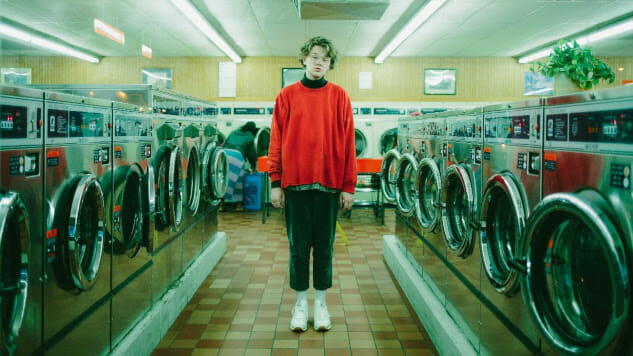Ghost Orchard’s New Album Bunny Pushes the Boundaries of Bedroom Pop
Photo by Jeen Na
When Sam Hall was 18, he fell in love. “We kind of started seeing each other as an accident,” he says, audibly grinning over the phone. “It wasn’t planned.”
Neither were the 300 songs that he scrapped on the journey to creating his latest album as Ghost Orchard. But here we are, three years later, with the exquisite new record Bunny.
Hall has been making music as Ghost Orchard for several years, most recently collected in 2016’s lo-fi, hazy Bliss. Months after that album came out, two seismic shifts altered Ghost Orchard’s sound: He started dating the partner that would inspire Bunny, and he made the jump from analog recording to digital, moving his sound from murky, acoustic songs to hip-hop inflected, stream-of-consciousness confessionals that’ll have you swooning in the lazy summer sunlight.
Both Bliss and Bunny were recorded in Hall’s Grand Rapids, Michigan bedroom. “A lot of Bunny is as literal as bedroom-pop could be,” he explains, a bit self-conscious about the genre name. But Bunny is something else, an immaculately textured and nuanced depiction of falling in love that’s all over the map, both emotionally and sonically. Lead single “Balloon” is a rhythmic and plucking groove for holding hands on a walk; the woozy R&B production on “Sheesh” will have your toes curling under the sheets; “Guess” is a four-on-the-floor banger that sounds like it’s on allergy medication. Hall had three full albums ready before he even started working on Bunny, ultimately deciding that those records sounded like he was trying on different costumes; “Yeah, I made a Duster album,” he says with a sigh.
“I realized there was a huge disconnect between the music I was listening to and the music I was making. At the time, I was listening to a lot of Aphex Twin and a lot of Frank Ocean. Drum and bass—stuff like that. I realized I wanted to make what I was currently listening to, or figure out how to transfer my past albums into that sound. I didn’t want to fully emulate someone else.”
“Carousel,” Bunny’s languid centerpiece, might be the best representation of Ghost Orchard’s style. Nostalgic and misty synths open the track, quickly brought underground by subterranean bass and skittish 808s. It’s an electronica-inflected groove that trades the club for the field, folding plucked, airy strings into the mix. Hall’s impressionistic vocals yearn for his partner during a low point in the relationship: “Alleys and dirt roads / Our timing wasn’t right / Love under streetlight,” he sings through heavily processed pitch-shifts.
At the end of the track, Hall included an early demo that sounds nothing like what you’ve just heard, trading the maximalist production for light bossa guitars and recorded to a hissing tape deck. Stripping away all the other layers, you can hear Hall’s pain in that moment; “I miss you,” he repeats, plaintively.
“It’s a completely different song that I just really, really loved. I have a hard time just letting something rest and letting it be.”
That restless energy is everywhere on the album, manifesting in shifting genres and lyrical trampolining. Like any good love story, Hall’s wasn’t the smoothest run: Following some personal complications, his partner, Lauren, moved in with him only three months after they started dating. He lets out a nervous laugh: “Most people shouldn’t do that.” But it proved fruitful—Lauren sings on the record.
“Just living with each other, you kind of hear people humming to themselves in another room or something like that, and I heard her do that. She has a really, really nice voice, so I asked her if she’d be comfortable with that. It ended up being really fun. It adds exactly what I wanted it to on those songs.”
-

-

-

-

-

-

-

-

-

-

-

-

-

-

-

-

-

-

-

-

-

-

-

-

-

-

-

-

-

-

-

-

-

-

-

-

-

-

-

-








































